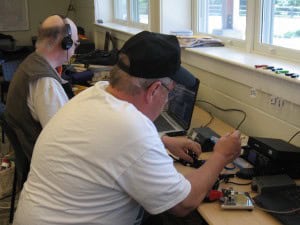
Amateur radio’s roots can be traced to the 19th century.
Over time, amateur radio, or “ham,” enthusiasts have significantly contributed to a number of things such as science, engineering, industry and social services. There are about 3 million operators active worldwide.
The term “ham” as a nickname for amateur radio operators originated in a derogatory usage by operators in commercial and professional radio communities.
Members of the Burlington County Radio Club participated in the National Amateur Radio Field Day exercise June 27–28 at the Tabernacle Emergency Services Building. This is usually the club’s biggest event of the year.
Field day gave ham radio operators a venue to demonstrate the science and skills of amateur radio by showcasing their temporary ham radio stations in a public location for folks to come see.
“It’s organized in a way in which it is not necessarily a contest, but we record how many public officials and kids come out and we document who gets the most views,” said Eugene Holben, a long-time member of the Burlington County Radio Club.
These creations have the ability to work reliably under any conditions from almost any location and create an independent communications network.
This event has been going on for 40 to 50 years now and is often a hit. More than 45,000 people participated in Field Day last year.
“It’s easy for anyone to pick up a computer or smartphone, connect it to the Internet and communicate with no knowledge of how these devices function to connect with each other,” said Sean Kutso, a member of the Amateur Radio Relay League, the national association for Amateur Radio. “But if there’s an interruption of service or you’re out of range of a cell phone tower, you have no way to communicate. Ham radio functions completely independently of the Internet or cell phone infrastructure, can interface with tablets or smartphones and can be set up almost anywhere in minutes. That’s the beauty of amateur radio during a communication outage.”
For more than 100 years, amateur radio has allowed people from all walks of life to experiment with electronics and communication techniques, as well as provide a free public service to their communities during a disaster, all without needing a cell phone or the Internet.
Over the years, as communication has changed, public service has become one of the most popular facets of amateur radio that attracts practitioners.
Amateur radio operators, using battery- or generator-powered equipment, often provide essential communications services when regular channels are unavailable due to natural disaster or other disruptive events.
“We are the first group able to set up and get going during disasters because our radios support themselves by using generators instead of radio towers that typically go down during severe disasters,” Holben said.
The Burlington County group was instrumental during Hurricane Katrina. It became an adjunct of the Red Cross to assist people who wanted to know how their loved ones were doing.
Holben got involved with radio many years ago after he graduated from high school in 1942. He went on to serve in the Navy where he would be sent to radio school because of his unique skill set.
Now a resident of Medford, Holben got into the Burlington County Radio Club after he moved to the area from Pennsylvania and was contacted by a few guys in the club.
“It’s a hobby for people in the community who like to operate radios,” Holben said.
He is one of the original people who set up the radio station on the Battleship New Jersey.
The Burlington County Radio Club now holds many of its activities on the ship, including multiple weekends where the guys come out for picnics and get introduced to different techniques by testing antennas.
The main objective of this group and its field day event is to advance the techniques of radio communication and to continually try to improve equipment to get further distances and more clarity.
“It’s interesting when you stop to think about it — 80 percent of all electronic developments over the years like cell phones and things of that nature were developed by amateur radios,” Holben said.
Anyone may become a licensed amateur operator. There are more than 720,000 licensed hams in the United States, as young as 5 and as old as 100.
With clubs such as the Burlington County Radio Club, it’s easy for anybody to get involved.









